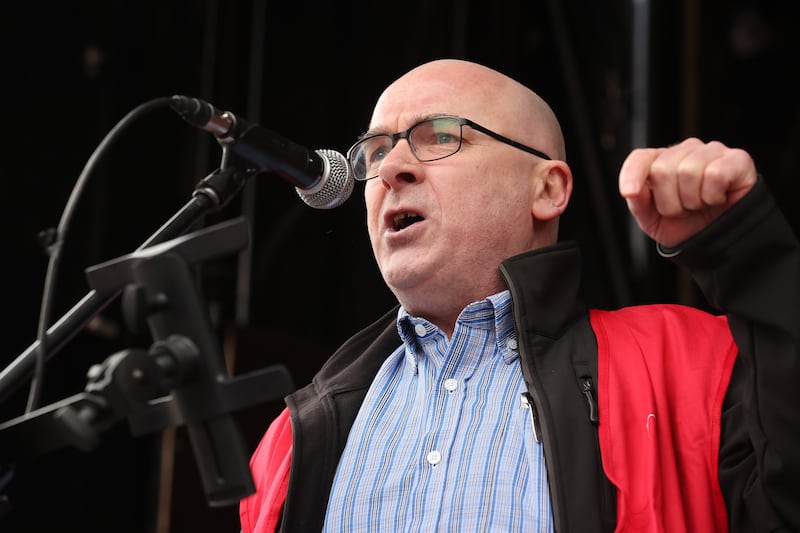SOCIAL workers in the Belfast Health Trust area are beginning industrial action on Thursday over “a sustained staffing crisis” that has left “vulnerable children in danger”.
It has also been confirmed that medical consultants across Northern Ireland will be balloted for strike action.
The NIPSA trade union said the action from social workers in Family and Childcare services will extend into the Northern Trust on May 2, rolling out to other trusts in the coming weeks.
In many area, staffing levels are said to be over 30% below the required levels for a considerable time.
“Long-term chronic understaffing has led to a position where the service is not being provided safely, staff are carrying excessive caseloads, and stress and illness are commonplace,” a spokesperson said.
- Consultants ‘left with no alternative’ but to ballot on industrial action over payOpens in new window
- Robin Swann: Leading GP calls for smooth transition after ‘disappointing’ decision from health minister to step down ahead of general electionOpens in new window
- ‘Pay us or lose us’ - Junior doctors speak to The Irish News on their first ever day of strike actionOpens in new window
“The crisis has led to vulnerable children being put in danger and people not being able to access essential services. The Health Trusts and the Department of Health have failed to meet their statutory obligations.”
They added that no resolution was found after attempting to engage with the Department of Health and the Health Trusts.
A “last-ditch” meeting was held with the Health Minister Robin Swan on Wednesday, but “did not reach a useful conclusion.”

NIPSA Deputy General Secretary, Patrick Mulholland, the industrial action was to make the service safer for users and staff.
“These health service workers are determined to ensure our health service does not let down the most vulnerable people in society,” he said.
“This action is only the start of our campaign to ensure children and families can rely on their health service to be there when they need it and to ensure it is fit for purpose.
“NIPSA will engage with employers to ensure appropriate mitigations are in place to protect life and limb.”
Meanwhile, the British Medical Association has confirmed that consultants in Northern Ireland will be balloted on industrial action – to be opened on May 7 and lasting for five weeks.
Representatives from the BMA Northern Ireland’s consultants committee have met with the Department of Health about “continuing erosion of consultant pay” and the impact this has on recruitment, retention and the impact this has on patient care.
With a new pay deal agreed for consultants in England, ongoing talks in Scotland and Wales as well as better pay available in the Republic – committee chair Dr David Farren said it was “imperative” that consultants in Northern Ireland did not fall further behind.
“We really feel we have been left with no alternative but to strike,” he said.
“Morale is at an all-time low among consultants here; we do not feel valued for the complex, challenging and stressful work we undertake, and we do not deserve to be paid less than colleagues in the rest of the UK or Ireland for doing the same job.
“In fact, given the crisis in our health service the job is arguably even harder here. It is imperative that we secure at least the same terms and conditions for consultants here.”
He said consultants were asked last year if they were willing to strike, with 77% of those who responded voting yes.
“But we have held off moving to a full ballot in the hope that with a new Executive and Health Minister in place we could make some progress and address this issue, but unfortunately we have not been able to come to agreement with them,” Dr Farren said.
Consultants in Northern Ireland are to be balloted on industrial action. NICC chair @David_Farren outlines why they have taken this decision.
— BMA Northern Ireland (@BMA_NI) April 25, 2024
Ballot opens on 7 May 2024 for five weeks.
Join. Vote. Win. pic.twitter.com/LgZaVOThgV
“The Minister has said that he will apply last years’ DDRB uplift of 6%, but doctors here are still waiting for that to be paid. We have been told it might be in the June pay run, just before the 2024-25 DDRB recommendation is made, so nearly a year late, all of which contributes to consultants feeling totally devalued.”
Feeling his colleagues had been left with no other option, he said: “If we don’t do something now to fix our pay, then what we will see is the continued loss of doctors from our health service and a system that will no longer be able to care for patients.”







